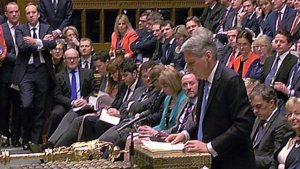- Real Estate
- Commercial real estate
- Coronavirus
- Corporate recovery, restructuring & insolvency

Shorter Reads
Update on changes to Covid-19 temporary insolvency law measures
The temporary insolvency restrictions protections introduced in 2020 after the start of the Covid-19 pandemic are being significantly eased.
1 minute read
Published 19 October 2021
Key information
- Specialisms
- Real Estate
The temporary insolvency restrictions protections introduced in 2020 after the start of the Covid-19 pandemic are being significantly eased and replaced by new targeted measures to support, in particular, small businesses and commercial tenants.
The UK Government have introduced changes to the regime for winding-up petitions. These changes will be in effect from 1 October 2021, withdrawing in part some protection for businesses. These changes will be in place until 31 March 2022. The new measures are contained in The Corporate Insolvency and Governance Act 2020 (Coronavirus) (Amendment of Schedule 10) Regulations 2021.
Winding-up petitions
Until 1 October 2021, a winding-up petition could not be presented:
- on the basis of a statutory demand; or
- on the basis of other evidence of a company’s inability to pay its debts unless the petitioning creditor has reasonable grounds to believe:
- that Covid-19 did not have a financial effect on the company; or
- that the company would have been unable to pay its debts even if Covid-19 had had a financial effect on the company.
From 1 October 2021 until 31 March 2022, it will be possible again to present a winding-up petition against a company on the basis of failure to satisfy a statutory demand. The creditor will also not have to consider the financial effects of Covid-19 on the debtor.
Commercial tenancies
However, not all restrictions are being removed. So a creditor will only be able to present a petition to wind up a company if the following conditions are met:
- the debt does not relate to unpaid rent or other sums due under a business lease;
- the debt to which a petition relates is £10,000 or more (although this restriction only applies to petitions based on statutory demands and not to petitions based on an unsatisfied judgment debt, or to petitions where the creditor proves that the debtor is cashflow or balance sheet insolvent); and
- the creditor must have given notice to the debtor which includes a statement that if no proposal for the payment of debt to the creditor’s satisfaction is made within 21 days, the creditor will present a winding up petition.
The new measures will apply to businesses of any size.
Rent Arbitration Scheme
Commercial landlords will continue to be prevented from forfeiting business leases under section 82 Coronavirus Act until 25 March 2022 or until new legislation is introduced to replace it.
The Government is proposing that the current moratorium will be replaced by a Rent Arbitration Scheme designed to ‘ringfence’ arrears relating to periods of enforced closure from March 2020 until restrictions for the commercial rent sector are fully lifted. The proposal is for the ringfenced debt to be dealt with by means of binding arbitration. In addition, before the new legislation takes effect, a Code of Practice will be published setting out ways in which rent arrears may be mitigated through negotiation.
Related content
Shorter Reads
Update on changes to Covid-19 temporary insolvency law measures
The temporary insolvency restrictions protections introduced in 2020 after the start of the Covid-19 pandemic are being significantly eased.
Published 19 October 2021
Associated sectors / services
Authors
The temporary insolvency restrictions protections introduced in 2020 after the start of the Covid-19 pandemic are being significantly eased and replaced by new targeted measures to support, in particular, small businesses and commercial tenants.
The UK Government have introduced changes to the regime for winding-up petitions. These changes will be in effect from 1 October 2021, withdrawing in part some protection for businesses. These changes will be in place until 31 March 2022. The new measures are contained in The Corporate Insolvency and Governance Act 2020 (Coronavirus) (Amendment of Schedule 10) Regulations 2021.
Winding-up petitions
Until 1 October 2021, a winding-up petition could not be presented:
- on the basis of a statutory demand; or
- on the basis of other evidence of a company’s inability to pay its debts unless the petitioning creditor has reasonable grounds to believe:
- that Covid-19 did not have a financial effect on the company; or
- that the company would have been unable to pay its debts even if Covid-19 had had a financial effect on the company.
From 1 October 2021 until 31 March 2022, it will be possible again to present a winding-up petition against a company on the basis of failure to satisfy a statutory demand. The creditor will also not have to consider the financial effects of Covid-19 on the debtor.
Commercial tenancies
However, not all restrictions are being removed. So a creditor will only be able to present a petition to wind up a company if the following conditions are met:
- the debt does not relate to unpaid rent or other sums due under a business lease;
- the debt to which a petition relates is £10,000 or more (although this restriction only applies to petitions based on statutory demands and not to petitions based on an unsatisfied judgment debt, or to petitions where the creditor proves that the debtor is cashflow or balance sheet insolvent); and
- the creditor must have given notice to the debtor which includes a statement that if no proposal for the payment of debt to the creditor’s satisfaction is made within 21 days, the creditor will present a winding up petition.
The new measures will apply to businesses of any size.
Rent Arbitration Scheme
Commercial landlords will continue to be prevented from forfeiting business leases under section 82 Coronavirus Act until 25 March 2022 or until new legislation is introduced to replace it.
The Government is proposing that the current moratorium will be replaced by a Rent Arbitration Scheme designed to ‘ringfence’ arrears relating to periods of enforced closure from March 2020 until restrictions for the commercial rent sector are fully lifted. The proposal is for the ringfenced debt to be dealt with by means of binding arbitration. In addition, before the new legislation takes effect, a Code of Practice will be published setting out ways in which rent arrears may be mitigated through negotiation.
Associated sectors / services
- Real Estate
- Commercial real estate
- Coronavirus
- Corporate recovery, restructuring & insolvency
Authors
Need some more information? Make an enquiry below.
Subscribe
Please add your details and your areas of interest below
Article contributor
Robin
HenryPartner - Head of Dispute Resolution Services
Specialising in Banking & financial disputes, Commercial disputes, Corporate recovery, restructuring & insolvency, Financial regulatory and Personal insolvency
Enjoy reading our articles? why not subscribe to notifications so you’ll never miss one?
Subscribe to our articlesMessage us on WhatsApp (calling not available)
Please note that Collyer Bristow provides this service during office hours for general information and enquiries only and that no legal or other professional advice will be provided over the WhatsApp platform. Please also note that if you choose to use this platform your personal data is likely to be processed outside the UK and EEA, including in the US. Appropriate legal or other professional opinion should be taken before taking or omitting to take any action in respect of any specific problem. Collyer Bristow LLP accepts no liability for any loss or damage which may arise from reliance on information provided. All information will be deleted immediately upon completion of a conversation.
Close
















































































